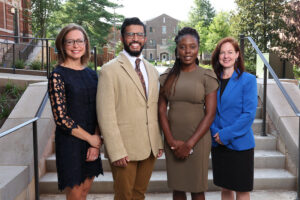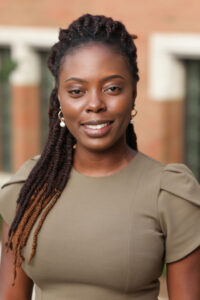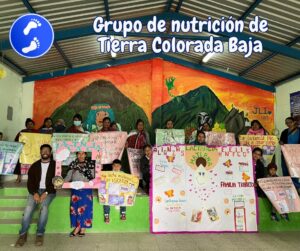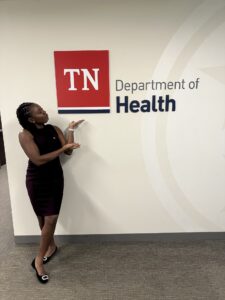By: Kyra Letsinger

When applying to Vanderbilt’s Master of Public Health (MPH) program, prospective students immediately face a pivotal choice: Do they want to follow the Epidemiology, Global Health, or Health Policy track? For those who choose the Global Health track, there is a passion for education, an interest in diverse perspectives, and a belief that all communities deserve access to the proper tools to maintain their health. No two students embody these characteristics better than second-year MPH students Tevin Mathew and Anjola Ajayi.
The only second-year Global Health students currently in the program, Mathew and Ajayi are connected by a commitment to improving maternal and child health, and the two brilliantly use their differing personal, cultural, and professional backgrounds to serve a population that is often left widely overlooked. Today, aided by skills developed in the classroom and in the field, they hope to not only aid the countries at the center of their research, but mothers and children worldwide and in their own communities.
Meet Tevin Mathew

For Tevin Mathew, what may seem like an overwhelming decision was made with no hesitation; he knew the Global Health track was his destined path.
Originally from the greater Memphis area, Mathew remained local for his undergraduate education, attending Rhodes College as a Bonner Scholar. A Spanish major, he was also on a pre-physical therapy track, having every intention of entering the field upon his graduation – that is, until he began working with local nonprofits focused on education among Hispanic populations. This community outreach experience combined with his Spanish coursework helped him to form a new vision for his future, one centered around global education.
After graduating with a Bachelor of Arts in Spanish, Mathew became a Fulbright Scholar, educating students in Colombia while also educating himself on another country’s health care system. What he found was major hurdles in access to care, even when seeking care for himself. Inspired by this inaccessibility and care inequity, upon returning to the United States, he began working towards a Post-Baccalaureate Certificate in Health Equity from Rhodes, a transformative experience that determined his future in global health.
“[The certificate program] was my crash course in public health,” said Mathew. “I took a global health course, my introduction to that subject area, and when I took that class, I realized, ‘This is everything I want to do, all my interests in one’.”
Going on to work as a medical scribe at a local outpatient clinic and a bilingual PrEP outreach specialist at a Memphis non-profit, Mathew’s path towards a Master of Public Health was further paved with each exposure to the world of health care. The final solidification? Being accepted into the Vanderbilt MPH program, one comprised of close professor-student relationships and collaborative peer work.
“I wanted something where I could directly connect with professors that invested in me,” said Mathew. “A small but close cohort was also important to me because we need those different perspectives. Coming to campus, meeting with Marien(Martin) and Elizabeth (Rose), my track directors, and just hearing about past students’ work and the connections they have in Nashville and globally, I thought to myself, ‘I need all of that’.
Meet Anjola Ajayi
Despite coming from a different background, Dr. Anjola Ajayi’s decision to apply for Vanderbilt’s MPH Global Health Track came just as naturally, much like her decision to become a doctor. Before coming to VUSM from Ibadan, Nigeria, Dr. Ajayi was a practicing physician in the Department of Obstetrics and Gynecology, University College Hospital, Ibadan, her dream since she was a small child.

“I grew up in an area where I was always in contact with pregnant women,” said Dr. Ajayi. “It was always fascinating to see some of the women I knew in the area go from the point the stomach was still a little small and see them progress. And at the end of the day, they had their babies. Being in contact with pregnant women, seeing their journey, and wanting to see a mother and baby alive at the end of the 9 months journey. Those were the things that actually sparked my interest. I’m still very much interested in [obstetrics and gynecology] — I stuck with it and put in all my best to be the doctor I am today.”
But something was missing for her. While helping her patients to the best of her ability, she felt more could be done to improve the health of the mothers and children she served. That’s when it hit her: Her patients needed proactive education to be well-informed about their health to understand better when seeking resources for help. The further she explored her options, the clearer it became to her that a master’s in public health, specifically with a global health program, would provide her the variety of perspectives and research opportunities she needed to serve her community best.
The community wasn’t just at the forefront when determining the type of program she decided to apply to; it was pivotal in her choice of where to attend.
“My very first impression was I was coming from a country that was my comfort zone to a place where I didn’t know anyone,” said Ajayi. “One of the things that I was looking for was to have that warm welcome, and I got that from Vanderbilt.”
Putting Passion into Practice
As part of Vanderbilt MPH’s curriculum requirements, students on all tracks must participate in a practicum, one they plan and design to meet their individual career goals. Epidemiology and health policy tracks require 240 hours of practicum experience, often with local and national governmental, health, and social service organizations. The Global Health track, however, necessitates an extraordinarily hands-on approach, requiring 400 hours of practicum experience in, “an international low-resource setting, or with international populations in the U.S.”
For Mathew and Ajayi, maternal and childhood health lies at the core of their field interests and acted as a key focus when determining their practicum sites. Luckily, with the help of Vanderbilt’s longstanding relationships with major international and national public health organizations, both students found practicums that provided hands-on experiences with maternal and child health education right here in Nashville and over two thousand miles away.

With a passion for health care within Hispanic communities and a desire to work with a non-governmental organization (NGO), Mathew traveled to Quetzaltenango, Guatemala, to work with Primeros Pasos, an NGO that provides high-quality medical, dental, and nutritional services that improve the quality of life of local communities. Vanderbilt students are some of the international volunteers who work closely with the locals, resulting from years of trust-building between students and members of the Palajunoj Valley.
“They actually started the clinic decades ago, but it’s all locally sustained, so every year, one or two MPH students go,” said Mathew. “Before I even applied to Vanderbilt, I knew this connection and thought, ‘I want to go there.’ The Center of Latin American, Caribbean, and Latinx Studies at Vanderbilt also has great connections where you can learn an indigenous language [K’iche’]. It really made me think, ‘How can I maximize my practicum with Vanderbilt by studying a new language there, and how do [K’iche’ and my practicum] connect?’”
During his five weeks with Primeros Pasos, Mathew created educational workshops for mothers and children, related to his core interest in nutrition. From hiking to remote communities to holding sessions on diabetes prevention, taking part in gardening workshops and ensuring families had access to nutritious meals, Mathew found immense joy and purpose in educating but also in witnessing and analyzing how receptive mothers were to this outreach.

Back in Tennessee, Ajayi had a similar experience in securing and taking part in her practicum. Like many MPH students, she found her practicum through Vanderbilt’s close connection to the Tennessee Department of Health (TDH). While working with TDH’s Maternal Health Innovations Program, she took an active role in the formation of Tennessee’s first maternal health strategic plan, conducting and facilitating community listening sessions with birthing parents, support persons, social workers, doulas, mental health advocates, midwives, and physicians from across the state. Much to her surprise, when analyzing the collected data, she found several commonalities between the sentiments of Tennesseans and her patients back in Nigeria.
“I was able to see that global health is actually proving to be local, and seeing the pattern of problems that all people face, especially in the rural areas,” said Anjola. “It was an eye-opener for me to see that the things that people would complain about in rural Tennessee are things that I could resonate with back home. It made me see that problems people face in different geographic areas, or even different countries, can be likened to each other.”
What’s Next? Making Their Research Dreams a Reality.
Now, deep into the first semester of their second and final year, Mathew and Ajayi are taking advantage of every opportunity that comes their way, including chances to expand their research interests. After being the only students in their practicum preparation class, the two realized a mirrored research interest related to their focuses on maternal and child health: the influence of male engagement in public health awareness.

Immediately, they began developing mirrored research efforts in two countries, Mathew focusing on malnutrition in Guatemala and Ajayi on cervical cancer prevention in Kenya. Encouraged by their mentor and Co-Director of the MPH Global Health Track, Marie Martin, Ph.D., M.Ed, the two submitted a joint application for the Association of Schools and Programs of Public Health’s (ASPPH) This is Public Health Global Grant Program and were selected as one of only twenty projects worldwide to join the second-ever cohort. The two are now hard at work to design their research, applying their class and practicum experiences to work with on-the-ground partner organizations like the Lwala Community Alliance in Kenya to train local staff in conducting focus groups and interviews with men in both countries.
This experience, both students expressed, is just one of many opportunities given to them by the MPH program that have made a major impact on them, not just as growing public health professionals but lifelong learners.
“The program definitely opens up a lot of opportunities, and then you can design and tailor the program to fit your needs,” Ajayi said. “I’ve gained many skillsets in my short time here: community engagement, communication, research, analysis, networking, meeting people in different fields, and collaborating with them. Those are things I am going to take with me.”